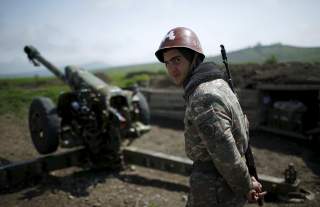The Nagorno-Karabakh Cease-Fire at 25
Marking the twenty-fifth anniversary of the cease-fire in the area of the Azerbaijan-Karabakh conflict.
Artsakh not only supported the proposals and calls by the mediators to strengthen the cease-fire, but also repeatedly proposed various initiatives to ensure the irreversibility of the peace process. One of the latest examples of the constructive approach of official Stepanakert is the willingness to provide international mediators with data from video surveillance of the situation on the border. The permanent video surveillance system installed by Artsakh on the Line of Contact may become an integral part of an international cease-fire control mechanism.
In this context, it is also important to stress the need for the implementation of agreements reached during the two post–April, 2016, summits in Vienna and St. Petersburg, providing for the introduction of a mechanism to monitor the situation on the Line of Contact and the mechanism for investigating incidents at the border, as well as expanding the office of the Personal Representative of the OSCE Chairperson-in-Office with a view to increasing its monitoring capacities. Three years later, the Vienna and St. Petersburg agreements, due to strong opposition by Azerbaijan, still remain on paper only.
However, the situation with Azerbaijan’s attempts to denounce the trilateral agreements on cease-fire and on strengthening the cease-fire, signed by the Defence Ministers of Artsakh, Azerbaijan and Armenia in 1994–1995, is even more worrying. Notes on the actual denunciation of these previously adopted documents were distributed by the Permanent Representation of Azerbaijan to the OSCE on April 11, 2016, and by the Permanent Mission of Azerbaijan to the United Nations on April 14, 2016. The Azerbaijani side has not yet withdrawn or in any way disguised those notes. Thus, Baku formally refused to recognize the political and legal basis of the cease-fire in the area of the Azerbaijan-Karabakh conflict, and hence, the entire peace process. Obviously, neither the strengthening of the cease-fire, nor the advancement of the negotiation process is possible without the full restoration of the agreement of May 12, 1994.
The question of the demarcation line of the opposing forces, which, under the mediation of the Russian Ministry of Defence, was recorded by all three parties as part of the cease-fire, deserves special mention. Consequently, implementation of the cease-fire agreement also means the restoration of the cease-fire line agreed to by the parties, which was violated by Azerbaijan in April 2016.
I believe that the combination and complementarity of two conditions—diplomatic (restoration of direct trilateral negotiations) and military-political (strengthening the cease-fire and ensuring the irreversibility of the peace process)—will create the necessary prerequisites for real progress in the peaceful settlement of the Azerbaijan-Karabakh conflict and ensure long-term stability in the South Caucasus.
Masis Mayilian is the Minister of Foreign Affairs of the Republic of Artsakh.
Image: Reuters

